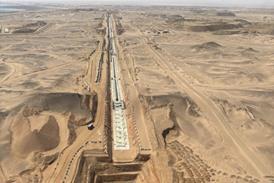There is a serious side to the viral video from Handforth Parish Council committee meeting, says Martyn Evans

The Planning & Environment Committee meeting at Handforth Parish Council in Cheshire that made it on to national news last week was entertaining but, along with the meeting of Shaftesbury Town Council in Dorset that made the news for similar reasons last year, pulled back a curtain on the hyper-local politics that inform planning decisions in all corners of our country.
Planning as an expression of democratic politics has its problems. I’m no advocate for executive autocracy and I know the good folk of the Handforth Parish Council committee are not involved in making big decisions affecting tens of thousands of people but it is not unusual, in my experience, for a significant planning decision to be made by a group of elected officials at a planning authority who do not represent the broadest demographic of their constituency.
This, obviously, has its roots in a wider problem about the kind of people who stand for election to local government. In our larger towns and cities you will find a pretty good representative group of elected councillors, but in our smaller communities it’s often people, however good their public service intentions, who have time on their hands who will find themselves elected. That usually means older, retired residents. According to the last national census of local authority councillors in 2018, carried out by the LGA, the average age of councillors was 59. 43% of councillors were over 65. Under 30s accounted for 3%. 96% of councillors ticked the White category and only 3% described themselves as either Asian- or Black-British. You might naturally assume that those age statistics indicate a dearth of, for instance, single parents, working people and young people whose futures are most affected by the decisions made in these meetings.
All we want is clarity on policy and consistency in its application
Obviously there are many councillors around our country who take great care to learn and understand the complex and intricate issues that lie behind good planning decisions. Equally there are many who don’t. Last year, before lockdown, I sat in a planning committee meeting where the chief planning officer had repeatedly to remind members as they were summing up their thoughts that their job was to apply planning policy as set by the law and the council rather than whether they liked the scheme or not. As a frequent applicant, like most architects and developers, all we want is clarity on policy and consistency in its application. Then we all know where we are.
A meeting with a senior government type last week was illuminating in this regard. We were discussing planning reform. Topics on the table for debate, he told me, included training programmes for planning committee members, an idea to expand committee membership to take in experts to sit alongside elected members and reform of the number of decisions that can be made by delegated authority once the elected council has set clear policy.
Of course, there is much wider and deeper reform to be considered. In New York, planning policy is set by elected councillors after long and detailed community and expert consultation. This policy is detailed and broad. Once set, all you need to be able to build is a permit from the planning authority and compliance with a building control process that checks you’re keeping to the rules. The democratic process sets the policy, officials issue permission. The result is a much speedier process that avoids capricious, political decision-making.
Imagine you were an applicant to a planning committee that didn’t remotely represent the wider community where you live? Even if you were simply a local resident seeking permission to extend your property. You will have incurred costs, done design work and spent a great deal of time consulting with your neighbours. Could you feel confident that, even if you’d complied with all the rules, your case would be considered fairly and judiciously.
Until our local democratic process becomes a lot more representative of our communities as a whole in demographic and in attitude we will not be delivering a service that is fit for all.
Postscript
This article has been amended to make it clearer that parish councils do not have the power to make planning decisions.
















No comments yet